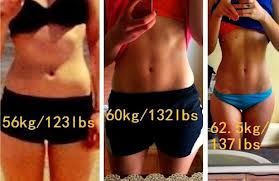What should my weight loss goal be/ why strength train?

Sheseeksstrength
Posts: 138 Member
Hi- I have been consistently logging for over 165 days. I still have a lot to learn and in fact I haven't lost any weight. I have it set at maintenance and I actually have gained some weight. However, my clothes still fit with an exception of one or two pairs of pants.
I am looking now to lose 10 lbs. I am currently 5'3" and 127-130 lbs. I would like to get down to 120 lbs.
I just started strength training within the last two months. I have always done cardio. I essentially have two questions:
1. Can I gain muscle eating at a deficit? If not, why is strength training beneficial?
2. What should I set my weight loss goal as? 1 lb a week... 2 lbs. a week?
Thanks in advance!
I am looking now to lose 10 lbs. I am currently 5'3" and 127-130 lbs. I would like to get down to 120 lbs.
I just started strength training within the last two months. I have always done cardio. I essentially have two questions:
1. Can I gain muscle eating at a deficit? If not, why is strength training beneficial?
2. What should I set my weight loss goal as? 1 lb a week... 2 lbs. a week?
Thanks in advance!
0
Replies
-
1. Other than when you initially start out (and even that is minimal), no. Lifting will help you preserve your muscle mass, especially when you have little to lose.
2. Neither. Go with .5 pounds a week and make sure you log everything accurately.0 -
1) You should strength train because as we lose weight you'll never just lose fat, but muscle too. Strength training guarantees less muscle loss. You can't gain muscle while on a deficient - even a small one - but you'll retain the muscle you have, while shedding the fat that lies on top.
2) 0.5lbs week should be your target per week loss rate - 10lbs will take a while to get off - but you'll loose more fat and less muscle this way.0 -
Muscle burns fat at a faster pace, so definitely strength training helps. And as long as you eat at a deficit, you should lose. And if you strength train, you should eventually see muscle definition.
For your height (I'm an inch taller than you are) and weight, you could try setting your goal for one lb a week, but that may not give you enough calories. My personal experience: I was stalled and the scale had not moved in ages. One of the personal trainers on this site suggested I increase my 1200 daily calorie allotment to 1500 so I did. Now I'm seeing movement on the scale. Sometimes, you just need to trick your body!0 -
Strength training is beneficial because it lessens the amount of muscle you lose when dieting. Muscle is what drives your metabolism, so losing muscle lowers your metabolism. Also, strength training gives you that tight body you're hoping for. Here's the picture I post all the time. On the left, a woman at her goal weight. Note that she looks soft and squishy. On the right, after a heavy lifting program. Even though she's heavier on the right, she's smaller and has the "toned" look people say they are trying to achieve.

0 -
kristen6350 wrote: »1) You should strength train because as we lose weight you'll never just lose fat, but muscle too. Strength training guarantees less muscle loss. You can't gain muscle while on a deficient - even a small one - but you'll retain the muscle you have, while shedding the fat that lies on top.
2) 0.5lbs week should be your target per week loss rate - 10lbs will take a while to get off - but you'll loose more fat and less muscle this way.
Thank you ALL for the advice!
0 -
If you're down to the last 10 lbs, I would shoot to drop 0.5-1 lbs/week. Really dive into the strength training. You'll start to slowly add some muscle, which helps with boosting your metabolism.
At this point, also watch your body compositional changes. You can make a lot of changes and not lose any weight. You can look, feel, and perform better without losing anything, so don't get frustrated if the weight loss is slow.0 -
Strength training is beneficial because it lessens the amount of muscle you lose when dieting. Muscle is what drives your metabolism, so losing muscle lowers your metabolism. Also, strength training gives you that tight body you're hoping for. Here's the picture I post all the time. On the left, a woman at her goal weight. Note that she looks soft and squishy. On the right, after a heavy lifting program. Even though she's heavier on the right, she's smaller and has the "toned" look people say they are trying to achieve.

This picture should be the header for this website.
If people would see and understand this picture... would answer so many questions on its own.
Lift heavy. Preserve muscle. Grow stronger. Cut calories to cut fat.0 -
Sheseeksstrength wrote: »1. Can I gain muscle eating at a deficit? If not, why is strength training beneficial?
It's unlikely you'll gain any muscle at a deficit, other than maybe some minimal newbie gains. You want to strength train so as to preserve as much as possible of the existing muscle you do have, while losing fat.
When you strength train, don't log it as exercise and don't eat back calories. Strength training doesn't burn very many calories. That's not the point.
(You can and should log your cardio exercise and eat back some of those calories, though.)Sheseeksstrength wrote: »2. What should I set my weight loss goal as? 1 lb a week... 2 lbs. a week?
At your height and weight, and with only 10lbs to lose, you should target 0.5lbs/week as your goal. Anything else is going to be unrealistic and too steep a deficit at this point. Remember that 0.5lbs/week is actually quite good for you -- percentage-wise, it's comparable to those 1-2lbs/week being shed by larger obese people.
You'll need to be *very* accurate in your logging and tracking, since with such a small deficit, there's not much room for error. Weigh everything on a food scale if you're not already doing so.
0
This discussion has been closed.
Categories
- All Categories
- 1.4M Health, Wellness and Goals
- 398.2K Introduce Yourself
- 44.7K Getting Started
- 261K Health and Weight Loss
- 176.4K Food and Nutrition
- 47.7K Recipes
- 233K Fitness and Exercise
- 462 Sleep, Mindfulness and Overall Wellness
- 6.5K Goal: Maintaining Weight
- 8.7K Goal: Gaining Weight and Body Building
- 153.5K Motivation and Support
- 8.4K Challenges
- 1.4K Debate Club
- 96.5K Chit-Chat
- 2.6K Fun and Games
- 4.8K MyFitnessPal Information
- 12 News and Announcements
- 21 MyFitnessPal Academy
- 1.6K Feature Suggestions and Ideas
- 3.2K MyFitnessPal Tech Support Questions







